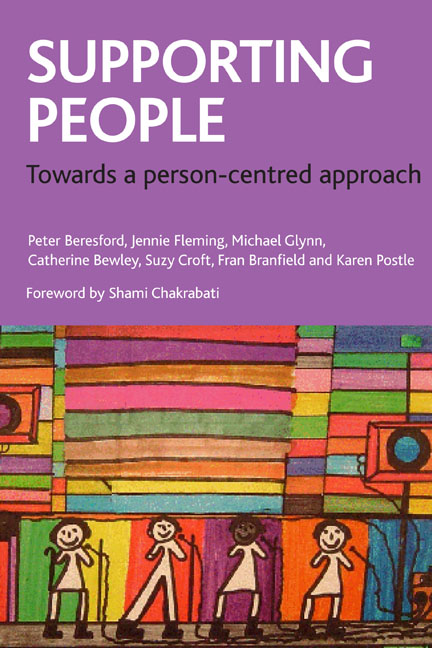Book contents
- Frontmatter
- Dedication
- Contents
- About the authors
- Acknowledgements
- Foreword
- Introduction
- Part One The Background to Person-Centred Support
- Part Two Person-Centred Support: Barriers and Ways of Overcoming Them
- Part Three Broader Issues for Person-Centred Support
- Part Four Making Change to Achieve Person-Centred Support
- Appendices
one - The Standards We Expect. How we did it: project methodology and methods
Published online by Cambridge University Press: 01 September 2022
- Frontmatter
- Dedication
- Contents
- About the authors
- Acknowledgements
- Foreword
- Introduction
- Part One The Background to Person-Centred Support
- Part Two Person-Centred Support: Barriers and Ways of Overcoming Them
- Part Three Broader Issues for Person-Centred Support
- Part Four Making Change to Achieve Person-Centred Support
- Appendices
Summary
The proposed project
Here we set out in more detail, for readers who are interested, how we carried out the project on which this book draws. A shorter account is provided in Chapter One.
The Standards We Expect project grew out of one of the programmes of work of the Joseph Rowntree Foundation (JRF), a leading independent funder in the field of social policy. This was the programme of its newly established Independent Living Committee, which built on the influential work of the Foundation's earlier Social Care and Disability Committee. The call for The Standards We Expect: Developing person-centred solutions’, as it was originally called, focused specifically on work to increase opportunities and expectations for choice and control from policy and practice for people with support needs, in line with the values of the philosophy of independent living, developed by the disabled people's movement. A programme of interrelated work was developed of which this project was the largest element.
The call for applications came out in the summer of 2005. The project was conceived of as a UK-wide change and development project. From the beginning, it was clear that it was not seen as just a research project, although it had clear research elements to it. Its focus was ‘change’, with the aim to offer wider lessons about what people wanted to live their lives more ‘independently’ and how that could be achieved. The tender documents stated that the aim was to:
• learn (by working closely with a number of local services and users) ways of overcoming specific and general barriers to person-centred approaches [to support];
• share empowering approaches (within existing resources and the existing practice setting) with a wider network of services, users and other stakeholders;
• comment critically during and at the end of the project on ‘the social care system’ – highlighting the opportunities to bring about change within the present system and/or provide pointers to a more radical revision of the system if that is needed.
Our consortium
Our consortium was just one of the groups that got together to bid for the tender. This went through a process of submitting initial expressions of interest, then applications, being shortlisted and then interviewed by the Foundation's Independent Living Committee.
Information
- Type
- Chapter
- Information
- Supporting PeopleTowards a Person-Centred Approach, pp. 381 - 406Publisher: Bristol University PressPrint publication year: 2011
